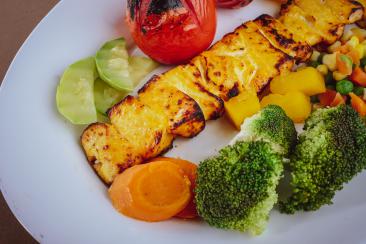A calorie is a unit for measuring energy. In terms of weight management, calories are used to describe how much energy is being consumed in the form of food and drink and the amount of energy exerted by the body through physical activity. Weight loss plans focus on shifting that balance – to either increase the energy exerted (by being more active) or decrease the energy consumed (by eating fewer calories).
Lowering the number of calories consumed – and undertaking physical activity to burn off more calories – is certainly one way to help you achieve your weight loss goal.
As a reference, the ideal calorie intake is considered to be around 2,500kcal a day for men and around 2,000kcal for women. However these are very general figures and the amount needed can vary a great deal from person to person – depending on your size, age, and how active you are.
That said, counting calories is a tried-and-tested way to understand how much energy is being provided to the body. There are numerous – digital calorie checkers – which you can download for your smartphone and/or laptop to help you work out your calorie intake. Using them is easy and enables you to keep a check on how many calories you’re consuming. You can check the calories in your breakfast, lunch, dinner, and snacks by adding the food item and the quantity. Regular calorie counting can help you make better choices and act as a real incentive when it comes to losing weight; for example, drinking a glass of water instead of fruit juice could save you up to 200 calories.
Packaged food always lists how many calories it contains along with recommended portion size. Some restaurant menus also now have useful calorie guides. When cooking at home, the total calorie content of the cooked food can be calculated by adding the calorie content of each ingredient. Some recipes cater specifically to calorie counting diets and are a good alternative to packaged food.
It’s important to note that calorie counting doesn’t mean you always have to avoid high-calorie food but it can help you make healthier choices. For example, a packaged “health bar” might contain literally hundreds of calories while a banana might be as low as 150kcal plus it can fill you up a lot more. You can break down your calorie intake by meal times, for example, 600 for breakfast, 300 for lunch, another 600 for dinner, and the rest for healthy snacks during the day.
Calorie counting should encourage you to develop healthier food habits. However the key to a healthy diet is balance; obsessing over calories can result in eating disorders and an unhealthy body. When choosing calories, it’s also vital to ensure that you’re providing your body with enough nutrients and minerals to function properly.
It’s also important to focus on food “quality” when counting calories. A recent study suggested that diet quality is necessary for both weight control and long-term wellbeing. “High quality” foods include unrefined foods such as fruit and vegetables, whole grains, healthy fats and healthy sources of protein. It’s known that consumption of healthy fats and carbohydrates can also help prevent dangerous conditions such as diabetes and heart disease.
In other words, it’s not just about calories – in order to sustain weight loss through calorie counting, it’s essential to include more whole foods and vegetables and decrease the consumption of refined grains and sugar.
Finally, if you do end up consuming too many calories on a particular day, don’t starve yourself the next day just to create a net deficit!. Keep going with your normal calorie intake but increase your physical activity for a few days to balance it out.
Don’t forget either that you can burn off calories with some very simple changes in lifestyle. Many fitness apps will tell you how many calories you exert through particular forms of exercise and that too can act as a real incentive. Aim to walk at least 10,000 steps a day if you can, and take up high intensity sports such as squash or basketball to burn off those extra calories.
Never lose sight of your health goals
Get more General Wellness tips in your inbox by subscribing here.



